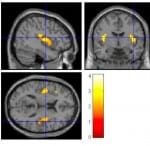 This week I will be visiting the Regional Eating Disorders Service at Ulleval Hospital University of Oslo:
This week I will be visiting the Regional Eating Disorders Service at Ulleval Hospital University of Oslo:
Clinical psychologist and current PhD student Ian Frampton has been carrying out research based at the unit using fMRI to determine if individuals with anorexia nervosa have abnormal patterns of activity in the insula cortex of the brain. He is examining patterns of activity in patients and controls while they perform cognitive tasks that tax working memory, executive control and attention, some of which are specially modified to use materials which might activate body image or food reward processing systems.
Historically, the insula cortex was known to play an important role in advanced processing neural signals coming from the gut (some people have even called it the “hippocampus of the gut”), but more recently it is perhaps more widely known for its involvement in emotion and socio-economic decision making (see earlier post on our coordination game fMRI study). Ians research spans the two fields, so I am really pleased to be involved with it and very much looking forward seeing his latest imaging results!
The research has the promise to provide better techniques for assessing and diagnosing eating disorders, as well as better fundamental understanding of the neural, cognitive and emotional mechanisms involved in anorexia and related conditions.


Comments are closed.